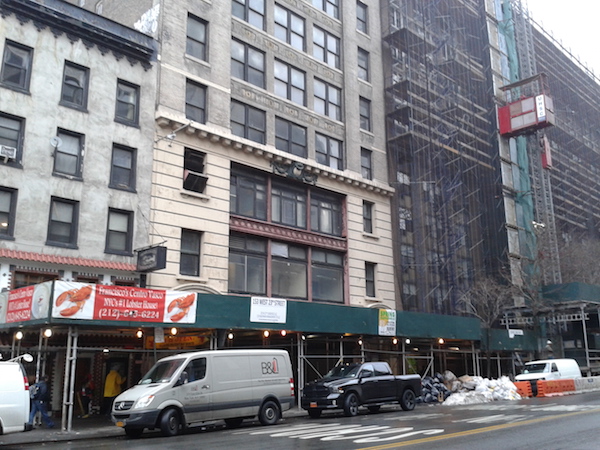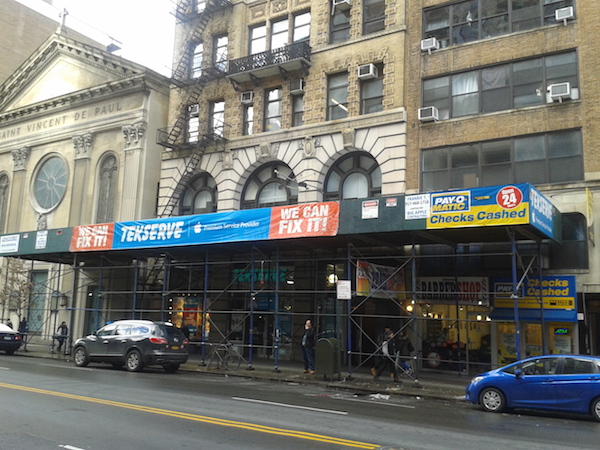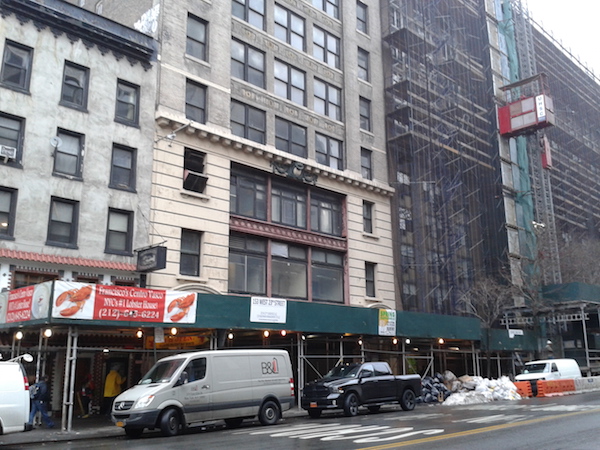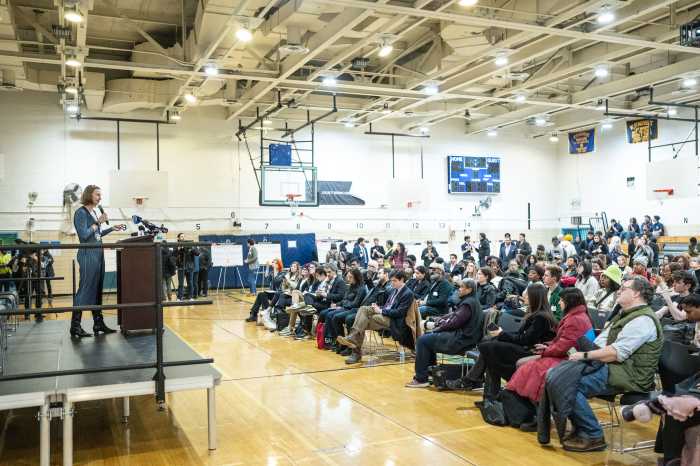
BY YANNIC RACK | Businesses in Chelsea are hoping for relief from the sidewalk sheds that routinely spring up across the city and often stick around for years.
A set of bills recently introduced in the State Legislature aims to kick the sheds to the curb — by ensuring building owners do actual work, rather than let them languish on the sidewalk, where they can become a nuisance for those hidden underneath.
Javier Quintans, who owns and runs the seafood restaurant Francisco’s Centro Vasco (159 W. 23rd St., btw. Sixth & Seventh Aves.), said his business has suffered under a sidewalk shed for the past 12 years.
“We’ve lost so many customers because of this,” he said, adding that the shed actually belongs to the building next door — which has been abandoned since the restaurant moved to its current address in 1999.
“In the beginning, when it went up, we took them to court to take it down. It really affected our business,” he said.
“They took it down for a couple of months, but then they put the scaffolding back up and it’s been there since 2004. We couldn’t afford to spend all that money on litigation again.”
The bills now in the State Senate and Assembly would mandate that extensions to sidewalk shed permits be granted only when the scaffolding was actively used for at least 10 days every month in the previous year.
Quintans said there has been no work using the sidewalk shed next door because the building has been abandoned for years, and was only recently sold.
“We hear complaints about it fairly frequently, both from commercial enterprises and from residents,” said State Assemblymember Deborah Glick, who co-sponsors the sidewalk shed bill in her chamber of the legislature. “And it does sometimes appear that it is being used as a vehicle for driving people either out of their homes or businesses [into giving up] their lease,” she said.
There are currently around 7,700 of the wood-and-steel structures scattered around the city, according to the Department of Buildings (DOB), which issues permits for scaffolding whenever building owners build or make repairs to their façade.
In many cases, they are clustered around the same block, according to DOB data. An analysis by amNewYork last year also found that over 1,300 projects are more than 18 months old — even though permits are usually issued for only a year.
The sheds not only block the view to businesses, but can become problematic for residents and passersby as well.
“It creates a dark area, debris can accumulate. If it’s not properly lit, it can be a safety concern,” Glick said.
“I think it’s always been an issue, it just seems that there is more construction in general,” she added, “and so people are experiencing what seems like an overload of these sidewalk sheds.”
The block where Francisco’s Centro Vasco sits, between Sixth and Seventh Aves., is a microcosm of common complaints about sidewalk sheds.
Most of one side of the street is shrouded in scaffolding, and the other businesses affected are no fans of their situation either.
“It’s bothering me very much,” said Boris, who is the manager of Chelsea Hair Studio (115 W. 23rd St.), and declined to give his last name. He said the shed, which went up in August, has taken a toll on business at the barbershop.
“It’s scaffolding, it’s dark. People just walk by and don’t even see us, and I can’t do anything,” complained Boris, who said the building owner claims he is repairing the roof, but added that he hasn’t seen any workers use the shed for months.
At Tekserve, an electronics store whose 119 W. 23rd St. location is just a few doors down from Chelsea Hair Studio, another sidewalk shed was put up in June.

“We’ve seen a drop in foot traffic of 20 percent every month since the scaffold was put in place,” said the company’s Vice President for Retail Sales and Service, Teresa Rivera.
Rivera estimates that Tekserve is now losing over $100,000 every month, and had to spend more than $50,000 for marketing in the last six months to make up for the drop in foot traffic.
“Many people, including myself, don’t like to walk under scaffolded buildings, and will purposefully cross the street to avoid doing so,” she said.
Under Local Law 11, buildings above six stories must undergo periodic inspections for the conditions of the façade once every five years, meaning the sheds spring up in regular intervals.
Rivera said the shed wrapping 119 W. 23rd St. was put up by the owner for precisely that reason, and has now been up for the past eight months.
“We were told the reason for the scaffolding is to allow ‘repointing of the brick façade,’ which is required periodically by New York regulation,” she said. “There was no concrete timeline for how long it would be up, but they indicated ‘a few months.’ ”
A DOB spokesperson said the department recently performed a sweep of all sidewalk sheds in the city and found that over 150 of them were no longer required.
“Inspectors looked for safety problems and common eyesores that reduce people’s quality of life, including sheds that haven’t been painted in years or are covered with graffiti, where the lighting is out, or where there are missing boards or structural supports,” the spokesperson told Chelsea Now, adding that inspectors issued more than 600 violations.
He added that DOB was currently reviewing the state legislation.
It is not clear how the department — which is notoriously understaffed when it comes to building inspectors — would ensure owners are meeting the 10-day minimum every month, or how much of a deterrent the $1,000 fine for noncompliance would be.
Glick, in an interview, emphasized that the language of the bill was up to the lead sponsor, East Harlem Assemblyman Robert Rodriguez, and that the bill’s purpose was not to micromanage the DOB.
“It’s really a directive to the agency not to just automatically renew these permits,” Glick said, adding that she hopes this would at least eliminate some of the longer-term scaffolds around her district and the rest of the city.
“There’s a balancing act between being punitive and whether or not you can get the legislation passed,” she said.
As for Quintans, he said the legislation was welcome news — although it won’t repay him for the 30 percent of customers he estimates have avoided his restaurant for the past dozen years.
It will likely also come too late to remove this particular sidewalk shed, since he said the building next door has now been sold and will be spruced up to house apartments.
Nevertheless, he hopes the legislation might spare other business owners from a similar fate.
“This can’t happen to another small business somewhere,” Quintans said. “Somebody who’s only starting out would have had to close [in our place]. And for what? It’s just not fair.”






































